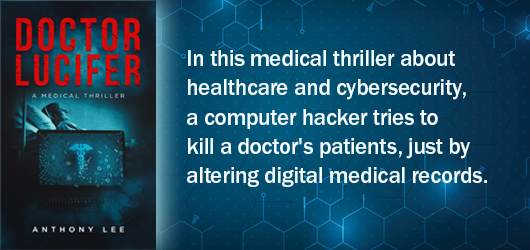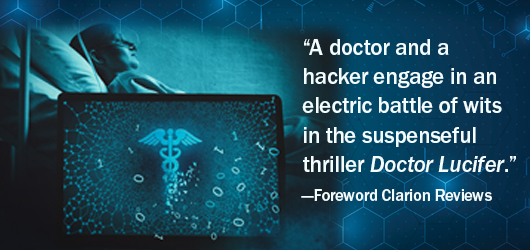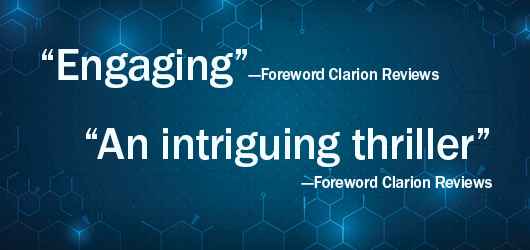Twenty-First-Century Medical Thriller: Doctor versus Hacker
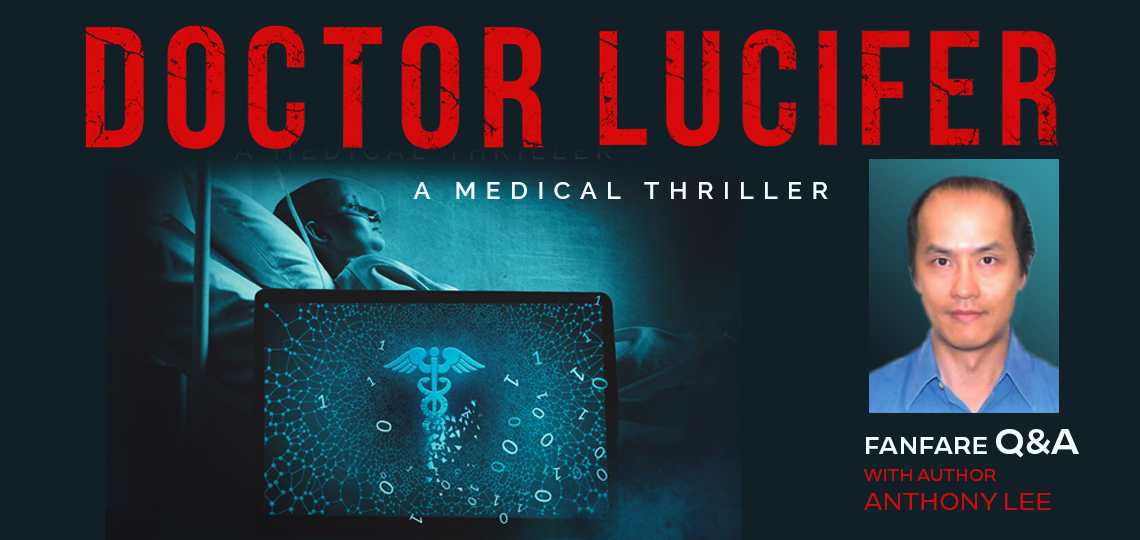
Talking Medical Thrillers with Anthony Lee, Author of Doctor Lucifer
Ah, the medical thriller. There’s nothing like terrifying readers with novels about how vulnerable humanity is to infectious diseases, deadly pathogens, docs-gone-bad, and countless other medical nightmares. Let’s welcome Anthony Lee to the very short list of med school graduates who have decided to use all of that knowledge to dream up the unimaginable.
Anthony’s newly-released debut thriller, Doctor Lucifer, earned a glowing Clarion review from Carolina Ciucci and we were compelled to get the two together to learn just what makes this doc-gone-author tick.
Enjoy.
Music is a crucial part of the book, capturing Mark’s emotional landscape. How was the process of weaving prose and lyrics?
First off, let me explain why I include references to music, as well as movies, in my novel. Back in medical school, especially during its third and fourth year, I experienced stress like no other. I discovered that two sources of leisure I previously considered to be mundane and ordinary—listening to music and watching movies—became emotional lifesavers during this difficult time. Having the radio play music during a fifteen-minute drive home from an intense day at a hospital made all the difference. Same for going to a movie theater for two hours every now and then. When I created the character of Mark Lin, I knew he had to have characteristics that make him stand out among other medical thriller protagonists. Why not have him be a music and movie buff in addition to being a doctor, just like me?
For certain emotional scenes in this novel, I spent time figuring out which songs, of those I’m familiar with, evoke the strongest and most appropriate emotion for those moments. Because lifting lyrics directly from songs requires permission, I avoided doing so. That’s OK. The two important things about any reference to a song title and artist is what kind of song it is and what emotions are associated with it. I make sure to capture both aspects, usually in as few words as possible in order to not slow down the storytelling too much. Familiarity with the song is not required, even though it can be a bonus.
Mark and Doctor Lucifer are presented as two sides of the same coin. In what ways would you say they mirror each other?
Both characters fixate on the worst impulses in others. That includes flaws with the medical profession, especially with how some doctors are, unfortunately, very egotistical to the point of upsetting or even harming patients. But that’s where the similarities end. Deep down, Mark still has respect for his profession and wants it to be great in the eyes of the public. He’s bitter on the surface largely because things right now are not close to this ideal. In contrast, Doctor Lucifer has no hope for humanity whatsoever. Given his backstory, he is obsessed with getting back at anyone who, in his view, has made his life a living hell.
Lucifer’s Worm is referred to as a virtual pandemic. Was the current technological scene of inspiration to the plot? How?
In recent years, there have been plenty of cybersecurity breaches. It’s hard to go months at a time without hearing about some instance of a major company having sensitive client information stolen and placed on the dark web. Subsequent identity theft is also a concern. Yet, that’s just the ordinary kind of cybercrime we see.
We also have to be vigilant about more drastic consequences of cybersecurity breaches. Remember when Colonial Pipeline got hit with ransomware in 2021? It led to temporary ceasing of operations, followed by panic buying of gasoline and rising gas prices. Speaking of ransomware, did you know that some healthcare facilities got hit with it? Imagine having to redirect patients to emergency departments at other hospitals because ransomware stalled functions in your own hospital. It happened to Ardent Health Services in the fall of 2023.
With all of this in mind, imagine this worst case scenario for a hospital doctor: a global cyberattack that makes any network vulnerable to further hacking, and at a hospital, a hacker alters medical records to insert errors that harm patients and pin the blame on their doctor. It may not have happened in real life yet (as far as I know), but one should not wait until it happens to take preventive action.
One of the book’s themes is the public’s distrust in, and many difficulties of, the medical profession. What would you like readers to get from the story in this respect?
In a nutshell, the medical profession is not glamorous. With perhaps a few exceptions depending on the medical specialty, it’s very hard work. The general public who doesn’t work in healthcare—particularly if they assume movie and TV portrayals of medicine are accurate—often don’t see that medicine is a heavy technical science. There are numerous diseases of the human body known today, each with their own tremendous level of detail about how the diseases start and proceed, not to mention what treatment options are available. Then there is ongoing research that may lead to new tests and treatment options supplanting older ones. People focus so much on what doctors do and much less on their medical knowledge that underlies the rationale behind what they do. When I am sharing medical facts that Dr. Mark Lin is thinking of, I am trying to help the public see how medicine really works: applying knowledge to saving lives. It’s not just about a doctor doing things. It’s also about knowing why the doctor does those things.
Then there are other aspects of being a medical professional outside what happens at the patient level, things like continuing medical education as a requirement for maintaining certification. When Mark is pointing out such things, that’s my way of showing the reader the medical profession in a fuller scope. It’s not a job like any other. It’s a calling that requires the utmost commitment.
Mark has conflicted feelings about his profession, feelings that are resolved at the end. What would you say, out of all the events of the novel, helped him reconcile his doubts and experiences the most?
It is undoubtedly the climax of the story. Without spoiling any details, it’s an unexpected situation that puts Mark in the most urgent circumstance of his life. There’s no time to weigh the options, yet the best one is obvious from the start. When it is all over, he realizes that there is still good in him, even if it’s deep down.
That being said, the biographical segment of the story deserves an honorable mention. When the trauma of the latest events becomes too great to handle, he starts to realize that he has been expecting way too much out of himself and others. Essentially, that moment begins his personal healing process.
In many ways, Mark’s neighbor underwent some of the same troubles and found an answer for them. Was he intentionally thought of as an older counterpart to our main character?
Mark’s neighbor, retired pediatrician Kenneth Randall, is indeed an older counterpart of the main character, though with a nearly opposite personality. I created him as someone who worked in the world of medicine in past decades, so that, when he is shown alongside Mark’s work experiences, the reader can get a glimpse into how the medical profession has changed over the years. It’s also a way for Mark to receive old-time wisdom from a doctor in a previous generation. It’s sort of like how, on the television sitcom Home Improvement, Tim Allen’s character would often chat with his neighbor Wilson and pick up advice to deal with marital and family issues. The difference here, though, is that Mark may listen to what Ken has to say but, because of his cynicism, may also resist taking it to heart.
Mark isn’t the only character who grows as a result of his experiences with Doctor Lucifer—Pierson is changed, as well. Would you say negative experiences are of greater significance for personal growth?
The more I think about it, the more it seems that, yes, negative experiences can be an important seed for growth. There’s nothing wrong with having wisdom instilled early on, like through parental guidance, to prevent learning certain things the hard way. At the same time, making mistakes and living through tough circumstances can make the same lessons sink in much more deeply.
Most of the book takes place in a hospital, the sterile environment emphasizing Mark’s lack of a personal life. How did you handle this imbalance between the professional and the personal?
The reality of many specialties of medicine is that a true 50-50 life-work balance doesn’t seem to exist. Doctors who work long hours have to make the best out of whatever free time they have off work. In fact, my best friend from medical school—who, unlike me, completed residency and went into full practice—would often tell me how incredibly stressful his workload is. He would definitely savor whatever time off he had, which included hanging out with me for dinner and a movie every couple of months.
The same goes for the fictional Mark Lin. He needs to eat, groom, rest, and sleep just like anyone else. I knew I had to include brief glimpses into his home life, of living alone in a spacious house, to show that there’s more to him than his professional life. He’s a human being, too.
For the majority of the story, Doctor Lucifer is a faceless enemy. What inspired this type of dynamic?
There is a relationship between the level of fear and the level of uncertainty. The more uncertain something is, the scarier the situation feels. When devising the thrills and chills of this story, I wanted to make it as scary as possible for the main character and the reader. That means providing very few clues about the identity of Doctor Lucifer. By making him an unseen foe who manifests only as a series of computer hacks and some threatening phone calls, all while the malware called Lucifer’s Worm is a global phenomenon, it is virtually impossible to guess who the villain is. The only thing the protagonist can do is survive until some lead opens up that he can latch onto and investigate.
Mark and Doctor Lucifer’s battle of wits echoes great pairs of literary antagonists, like Sherlock Holmes and Moriarty. What are some of the influences on their back-and-forth?
Believe it or not, my series of medical thriller novels, including Doctor Lucifer, gets some of its inspiration from a different kind of thriller series: the James Bond series of spy thrillers, both the books and the movies. I enjoy the Bond novels and films, not just for the suave superspy but also the many megalomaniacal villains he faces, because the evil schemes have major global implications if they are not stopped. It also shows how, in order to have a memorable hero, you need an equally formidable villain for the hero to go up against.
Being inspired by the importance of the villain, I make sure to make my antagonist as memorable as the protagonist, giving him as much of an important and influential backstory that underlies the character’s psyche. I also make sure to link the villain to some broad topic. Just as James Bond battles villains whose plots could upset the world order in specific ways, the villains in my medical thrillers represent specific societal ills whose impacts spill over into the world of healthcare. In the case of Doctor Lucifer, it’s about destructive computer hacking that negatively affects healthcare, with deadly results. I have plenty of ideas about how different bad things in society seep into Mark’s hospital, creating public health crises that he does not hesitate to stop at their root. I am excited about developing my series of medical thrillers featuring Dr. Mark Lin, because the possibilities are fun to explore.
DOCTOR LUCIFER
A MEDICAL THRILLER
Clarion Rating: 4 out of 5
A doctor and a hacker engage in an electric battle of wits in the suspenseful thriller Doctor Lucifer.
In Anthony Lee’s engaging thriller Doctor Lucifer, a steadfast doctor is targeted by a vicious hacker.
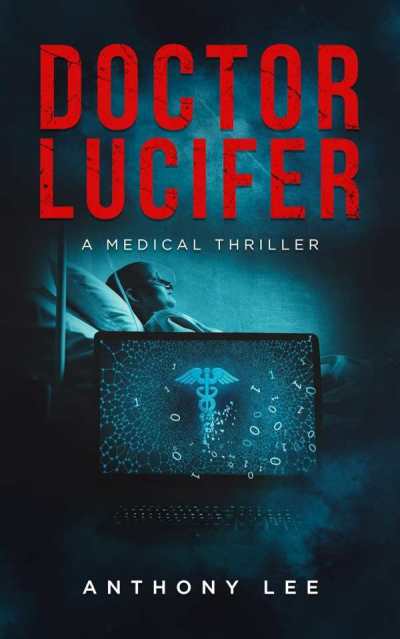
Mark is a somewhat distant internist who often turns to music to express his states of mind. Careful to a fault, he has never prescribed the wrong medications to anyone or forgotten a patient’s allergies. Nonetheless, his charts are now full of errors—a potential result of Lucifer’s Worm, a cyberattack of enormous proportions. Indeed, Mark has been targeted by Doctor Lucifer, who wants to ruin his life and career.
The book’s characterizations are somewhat limited to the two central foes, who engage in an electric battle of wits throughout—at no point is it clear which of them will triumph. And Mark narrates, revealing much about himself as he goes. After a disengaged dinner with friends, for example, he reflects,
I’ve been like this my whole life… . antisocial. Not the kind of antisocial with rebellion against authority. The kind where I want to be alone. Unsociable is more like it.
In addition to taking time to look at the stars and savor a good meal, he also makes thick use of medical jargon; even in casual situations, he is prone to leading with his professional expertise. And in conversation with others, he’s somewhat wooden but precise: “I must be prepared. You never want to be stuck in a crisis situation with no way out.” In interpersonal situations and elsewhere, he’s fleshed out as both a committed professional and an often self-righteous person who resists forgiving other people’s shortcomings. His general disillusionment makes him more vulnerable to formidable Doctor Lucifer, who has a sadistic streak and who foments anger toward medical professionals.
Moving with speed through the span of one workweek during which Mark has to fight against his enemy’s machinations in order to protect his patients, the book’s progression is quite dependent on its themes: it functions as a narrative critique of society’s general reliance on technology and on the internet in particular. The plot twists and builds upon itself as a reflection of such underpinnings, leading Mark down mistaken paths in his attempts to catch his enemy and resulting in a constant state of tension, even after the hacker’s identity is revealed. And the final confrontation is suspenseful as well: Mark winds up in an impossible situation and has to fight his way out, but his cleverness leads to a satisfying resolution.
Doctor Lucifer is an intriguing thriller in which a doctor fights to protect his life and his career against a massive, unanticipated cyber threat.
Reviewed by Carolina Ciucci May 22, 2024
Carolina Ciucci

